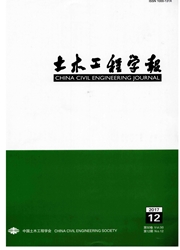

 中文摘要:
中文摘要:
采用预应力混凝土梁构件,通过快速冻融试验方法,对经受冻融损伤的预应力混凝土梁的受弯全过程进行试验研究。分析冻融循环次数对于预应力混凝土梁受弯性能的影响,包括开裂荷载、极限承载力及抗弯刚度。构件经历的冻融循环次数为0、75、100、125。结果表明:冻融后的预应力混凝土梁在荷载作用下仍能较好地符合平截面假定,其开裂荷载随着冻融循环次数的增加呈直线下降。预应力混凝土梁的极限承载力随着冻融循环次数的增加旱加速下降。冻融循环对于开裂前的抗弯刚度影响较小;构件开裂后,冻融次数越多刚度下降越大;冻融后的构件破坏时延性较差。此外,根据冻融后混凝土材料受压应力一应变曲线的变化特点,从等效应力图形出发,给出冻融后预应力混凝土梁极限承载力的计算方法。
 英文摘要:
英文摘要:
The static loading experiments of prestressed concrete beams subjected to quick freeze-thaw cycles were carried out. Freeze-thaw effects on flexural behaviors, such as cracking moment, ultimate moment and flexural rigidity, were analyzed. The specimens experienced 0, 75, 100 and 125 freeze-thaw cycles before mechanical tests. Experimental results show: after the freeze-thaw cycles the plane-section assumption still can be applied to the specimens very well, and the cracking moment decreases linearly with the increment of freeze-thaw cycles. The ultimate moment drops non- linearly with the increase of freeze-thaw cycles. Before cracking, freeze-thaw damage has little effect on the flexural rigidity of beams, after cracking of the beam, however, the flexural rigidity decreases with freeze-thaw cycles. The ductility of beam experienced freeze-thaw cycles will be weakened. In addition, based on the varying characteristics of compressive stress-strain curve for concrete experienced freeze-thaw cycles and the figure of equivalent stress, the computational method of ultimate moment is achieved.
 同期刊论文项目
同期刊论文项目
 同项目期刊论文
同项目期刊论文
 期刊信息
期刊信息
